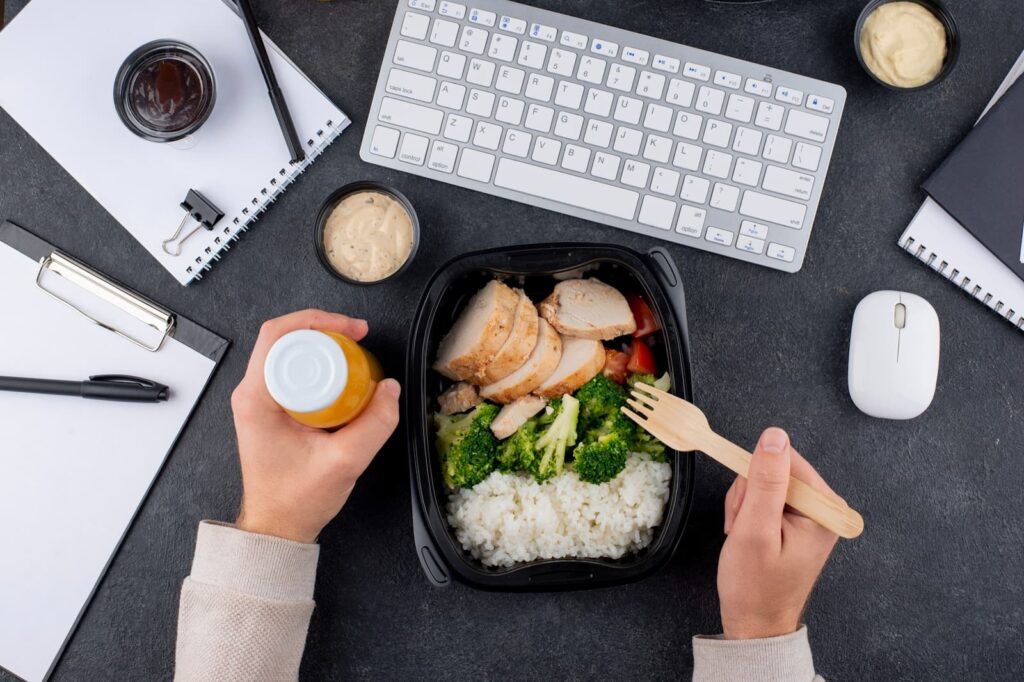In today’s demanding work environment, juggling deadlines and navigating busy schedules often means compromising on simple health practices. While efficiency is a top priority, it’s easy to overlook something fundamental: your digestive well-being at work. Many professionals experience stomach discomfort, indigestion, or energy dips linked to their workday habits. This guide shares essential, actionable strategies to foster a healthier, happier stomach, helping you stay energetic, focused, and productive throughout your workday.
Adopting just a few key habits can significantly reduce the risk of uncomfortable digestive issues, allowing you to perform at your best without the distraction of tummy troubles.
The Golden Rule: Impeccable Hand Hygiene
This might seem basic, but it is the absolute first line of defense against foodborne illness and germ spread in any shared environment.
- Before You Eat: Always wash your hands thoroughly with soap and water for at least 20 seconds before preparing, handling, or eating any food.
- After Shared Spaces: Just touched the office microwave door, communal coffee pot, or printer? Wash your hands again before you touch your food.
- Hand Sanitizer as Backup: Keep a personal hand sanitizer (at least 60% alcohol) at your desk for quick sanitization. Remember, it’s a good backup but not a substitute for washing with soap and water when possible.

The Cold Truth: Master Refrigeration & Storage
That delicious leftover from last night or your freshly packed lunch needs proper care to stay safe and appetizing, especially in an office refrigerator.
- Refrigerate Promptly: Get perishable food into the refrigerator within 2 hours of preparation, or 1 hour if the room temperature is above 90°F (32°C).
- Avoid the “Danger Zone”: Bacteria multiply rapidly between 40°F (4°C) and 140°F (60°C). Never leave food out at room temperature for too long.
- Label Your Leftovers: If you’re bringing food for a few days, label it clearly with the preparation date. Aim to consume leftovers within 3-4 days.
- Airtight is Right: Store all food in sealed, airtight containers to prevent cross-contamination and maintain freshness.
Hot & Safe: Reheating Foods to Perfection
Reheating isn’t just about warming up your meal; it’s about making food safe to eat again by eliminating potential bacteria.
- Use a Microwave (Wisely): Ensure food is heated thoroughly to at least 165°F (74°C). Stir your food halfway through the heating process to distribute heat evenly and eliminate any cold spots where bacteria can survive.
- Avoid Repeated Reheating: Try to only reheat a single portion once. If you anticipate wanting more later, separate that portion before the first reheat.
- Discard When in Doubt: If food looks, smells, or tastes off, or if you’re unsure how long it’s been in the fridge, it’s always safer to discard it immediately. When in doubt, throw it out!

Clean Spaces, Happy Tummies: Your Workspace & Shared Areas
Your personal desk and the office kitchen are communal zones that can harbor germs if not regularly cleaned.
- Wipe Down Your Zone: Regularly clean your desk surface, keyboard, mouse, and phone with disinfectant wipes.
- Office Kitchen Etiquette: Be mindful and clean up any spills immediately. Wipe down shared surfaces (microwaves, counters, fridge handles) before and after use. Help keep communal bins emptied regularly.
- Don’t Share Utensils or Bottles: While friendly, sharing personal eating utensils, cups, or water bottles can easily spread germs. Use your own!
Beyond the Basics: Mindful Eating for Digestive Wellness
While food safety is paramount, how you eat also plays a significant role in your overall digestive comfort.
- Stay Hydrated: Drink plenty of water throughout the day. Dehydration can lead to digestive sluggishness and discomfort.
- Eat Mindfully: Try not to rush your meals. Chew your food thoroughly and take short breaks. This aids digestion and can prevent indigestion.
- Listen to Your Body: Pay close attention to how certain foods make you feel. If a particular food consistently causes discomfort, consider reducing or avoiding it.
Your Collective Health is Your Collective Strength
Fostering a healthier work environment is a shared responsibility. By consistently practicing these simple yet highly effective habits, you can significantly reduce the risk of stomach sickness and foster a more comfortable, productive, and thriving environment for everyone. Prioritizing your digestive health helps ensure you can bring your best self to work every day.
For more valuable health and wellness insights, visit the Access-Salud Blog regularly and follow us on our social media channels to stay up-to-date with the latest health advice and community wellness initiatives from Access-Salud!




